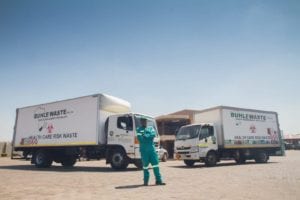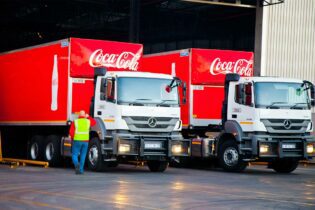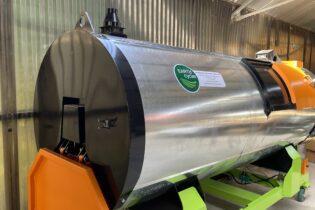Buhle Waste is a second-generation family business that is 100% black-owned and -managed. The company strives to achieve excellence in all of its business activities in the communities in which it operates. Buhle Waste strives to be an embodiment of ubuntu, knowing that it takes a community to help raise a business.
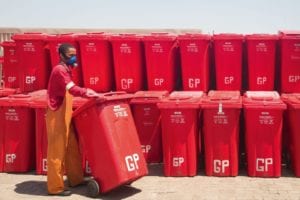 Our business has been raised on the belief that our homes and cities must be beautiful spaces; a love for our people and work should be fostered; and a respect for our environment needs to be maintained. We strive for beauty, love and respect in all that we do,” says Dr Phetole David Sekete, founder and CEO of Buhle Waste. In 1997, family man and medical practitioner Sekete recognised that the township in which he was living was plagued by poor service delivery; waste was piling up in the sewerage system and rubbish heaps were strewn along the streets – and these areas had become the playgrounds of children. Sekete’s medical practice was full of patients who were suffering from ailments caused by this mismanaged waste. Dedicated to preventative healthcare, Sekete committed himself to bringing efficient waste management to the townships around South Africa.
Our business has been raised on the belief that our homes and cities must be beautiful spaces; a love for our people and work should be fostered; and a respect for our environment needs to be maintained. We strive for beauty, love and respect in all that we do,” says Dr Phetole David Sekete, founder and CEO of Buhle Waste. In 1997, family man and medical practitioner Sekete recognised that the township in which he was living was plagued by poor service delivery; waste was piling up in the sewerage system and rubbish heaps were strewn along the streets – and these areas had become the playgrounds of children. Sekete’s medical practice was full of patients who were suffering from ailments caused by this mismanaged waste. Dedicated to preventative healthcare, Sekete committed himself to bringing efficient waste management to the townships around South Africa.Humble beginnings
Buhle Waste began in the dusty streets of Katlehong with a single truck and seven staff members, managing the waste of the local communities in an effort to bring a sense of beauty and pride to their environment. Over the years, the company has gained experience through the trials of business hardships and successes; it now operates nationally with over 350 staff and a fleet of over 70 trucks, with offices, warehouses and/or treatment plants in the Gauteng, Free State, Limpopo and Mpumalanga provinces. “Our dedication to our community and our respect for our environment have continued to form the foundation of our business operations to this day. Infused in our foundation of operations is the perseverance, resilience and dedication to achieve success for our clients,” notes Sekete. “When we first began operations in 1997, it was a tense time for black businesses, which had very little access to capital because of the conservative financing mentality of the banks. In addition to that, the pressures from the larger, white-owned corporations within the industry, who were resolved to minimise any new entrants into the business, were taking their toll on our business operations and ability to expand in scale and scope,” he explains. Sekete believes that without government interventions, namely BBBEE, the waste industry may not have changed much by today and the sector would have remained in the hands of very few companies who controlled the market share of the industry. “Today, we find a relatively fragmented industry with lower barriers to entry, overall – there is greater economic inclusion, leading to a spurring in the economy. In addition, the flood of new entrants into the market contributes to a more competitive environment – this has been beneficial to the companies, individuals and entities that rely on our services,” he continues.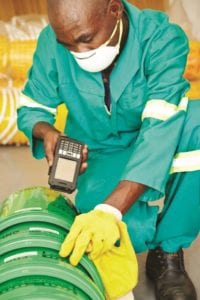 An evolving operation
An evolving operation
As a business, Buhle Waste has continued to evolve and adapt to the changing circumstances; like the environment it serves, the company has taken on its most resilient characteristics – innovation forms a pillar of the business and its continued growth and success. The company has continued to invest in technologies that will assist it in achieving its zero-waste-to-landfill goals while simultaneously differentiating its value proposition in the market. In its early years, the company was heavily dependent on other, larger waste management companies that were involved in the treatment and disposal of waste. Today, Buhle is one of the largest waste treatment companies in the country.“To achieve our zero-waste-to-landfill vision and minimise our environmental impact, we have invested in green technology that has no emissions and reduces waste from treatment. As such, we invested in a steam treatment injection (STI) technology that utilises a steam injection chamber, as opposed to incineration, for treating medical and hazardous waste at high temperatures to sterilise and shred the waste, rendering it non-hazardous and safe to handle.”
The STI is based in Gauteng, making Buhle Waste the first waste management company to have an incinerator and non-burn technology on the same premises. The company’s capacity to treat waste is greatly increased, while its transportation impact is reduced.

